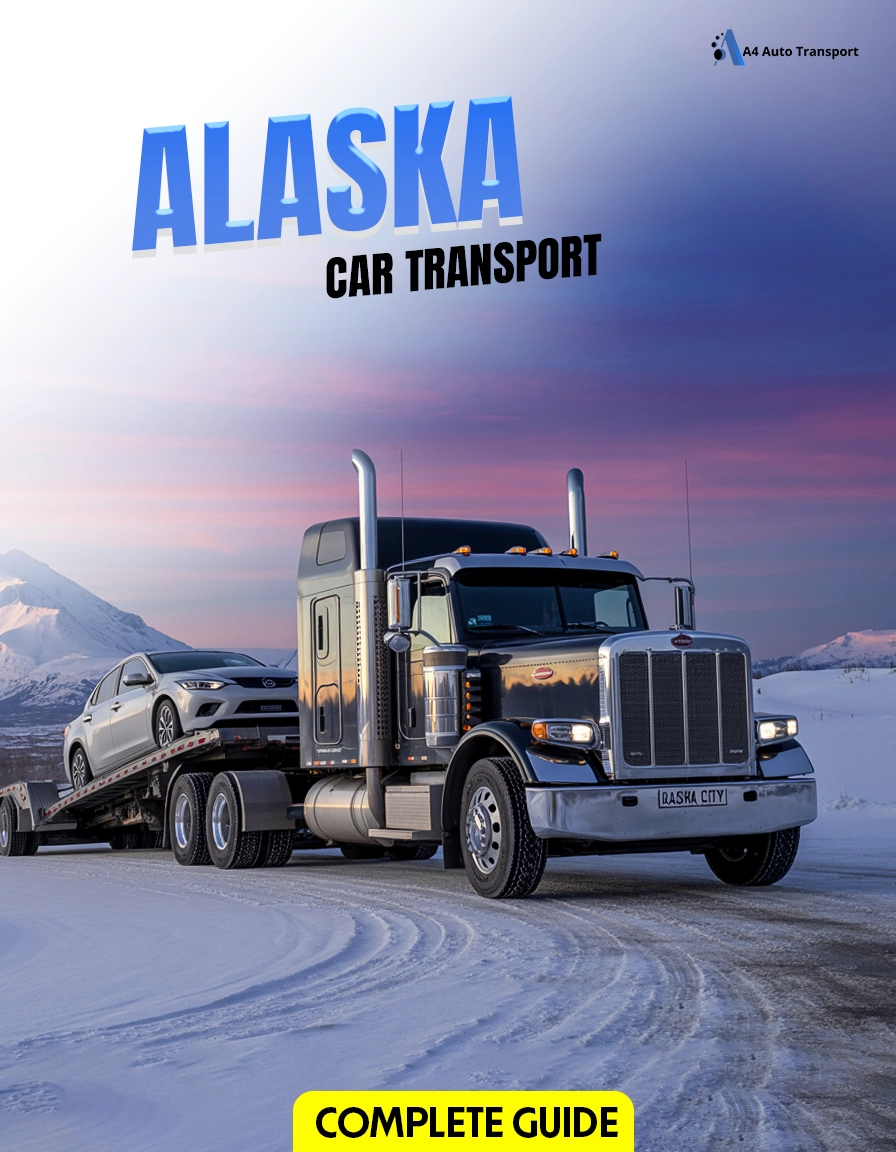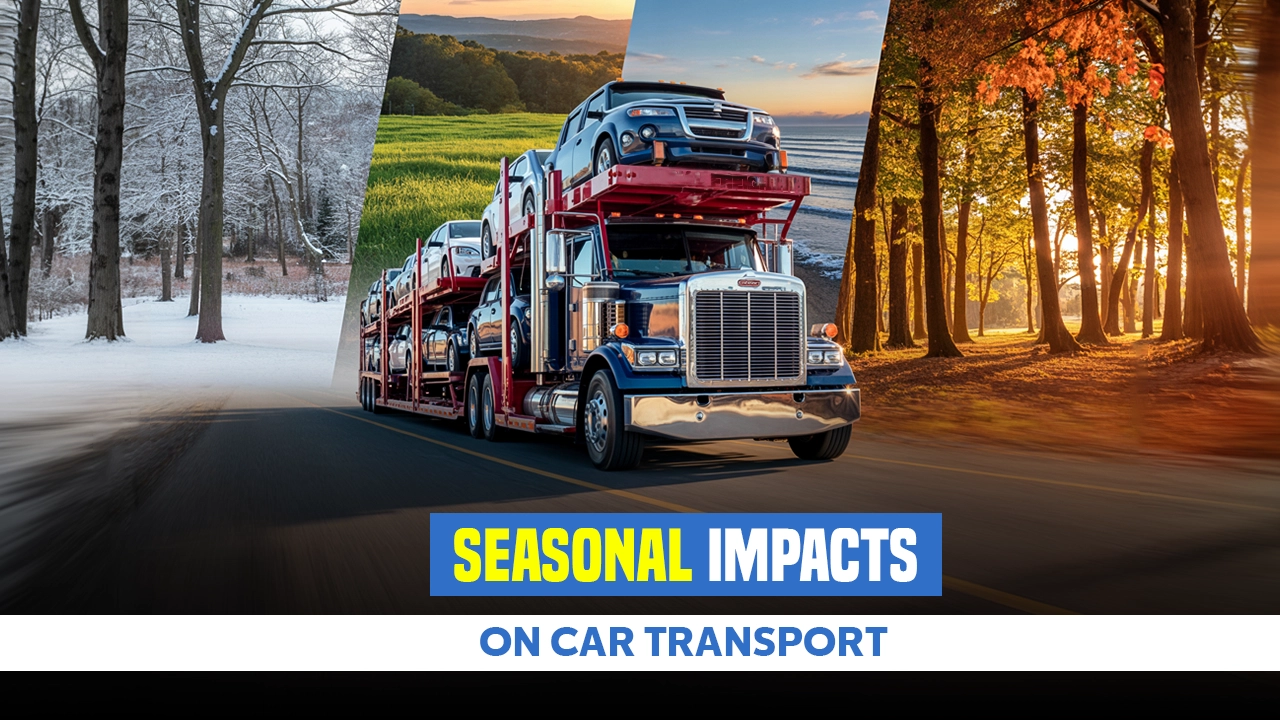Alaska Car Transport 2026 | Rates, Routes & Recommended Companies
Navigate Alaska Car Shipping With Us
Shipping a car to or from Alaska can feel daunting, but with proper planning and the right guidance, the process can be smooth and straightforward. At A4 Auto Transport we’ve researched and analyzed countless Alaska car shipping scenarios, from navigating remote highways to coordinating ground and sea transport.
For Alaska car shipping, it’s crucial to understand the state’s unique logistics, including limited carrier routes, seasonal weather challenges, and port schedules. Costs typically range from $2,200 to $3,500+, depending on distance, transport type, and timing.


Top Auto Transport Company to Ship a Car To/From Alaska

AutoStar Transport Express
Essential Steps for Shipping a Car To or From Alaska
Explore and Compare Shipping Options
Request quotes from trusted Alaska car shipping providers. Be sure to compare options such as open vs. enclosed transport and port-to-port vs. door-to-door service, especially for routes involving ocean freight. Learn how to obtain and compare car shipping quotes .
Select an Experienced Alaska Transporter
Choose a licensed, bonded, and insured auto transporter with proven experience in Alaska logistics, including ferry coordination and remote area access.
Gather Required Documentation
Prepare your vehicle title, registration, bill of lading, photo ID, and any additional documents required for international shipping if your vehicle passes through Canada or crosses maritime borders.
Recommended: Check out the car shipping documents.
Prepare Your Vehicle for Long-Distance Transit
Clean your car inside and out, remove all personal belongings, and ensure the vehicle is in operable condition. This minimizes customs delays and loading issues.
Coordinate Pickup, Drop-Off, or Port Delivery
Decide whether you’ll deliver your vehicle to a designated port (e.g., in Seattle or Anchorage) or arrange door-to-door transport, which may be limited in very remote Alaskan regions.
Vehicle Inspection and Departure
Before transport, your car will be inspected and documented for any existing damage. It will then be loaded for secure transit, often including both land and sea travel legs.
Receive and Inspect Your Vehicle Upon Arrival
Upon delivery, conduct a thorough walkthrough with the driver. Confirm the vehicle’s condition before signing the Bill of Lading. Consider exploring ways to ship a car
Popular and High-Demand Vehicle Shipping Routes To and From Alaska
Whether you’re relocating, or purchasing a car out of state, these high-demand routes to and from Alaska highlight common transit paths, estimated costs, and important logistics to consider.
Alaska relies heavily on port connections for shipping vehicles to the Lower 48, with Seattle being one of the most popular destinations. This route is frequently used by residents relocating or moving for work.
Service Type: Door-to-port and port-to-port available depending on city
Vehicles shipped from Seattle to Alaska usually involve ocean freight combined with ground transport, making timing and scheduling crucial. This route is commonly chosen by buyers and families moving to Alaska.
Service Type: Port-to-door or port-to-port depending on availability
This long-distance route typically combines trucking and ocean freight, requiring careful planning for timing and costs. It’s popular among students, snowbirds, and long-distance movers.
Tips: Book early due to limited departure schedules
Returning vehicles from Alaska to Southern California involve ocean freight to the West Coast and ground transport to LA. Luxury cars often benefit from enclosed shipping on this route.
Tip: Use enclosed transport for luxury vehicles
Vehicles shipped from Alaska to Texas require coordination between ocean freight and long-haul trucking. This route is commonly used by military families and professionals relocating for work.
Service Options: Port-to-door and full door-to-door auto transport in major metro areas
Shipping a vehicle from Texas to Alaska combines long-distance trucking and ocean transport, making timing and scheduling key for smooth delivery. It’s often chosen by military personnel and corporate relocations.
Service Options: Terminal-to-terminal auto shipping in Seattle may reduce cost
This long-distance route requires careful planning due to combined ocean and ground transport. It is frequently used by retirees and families relocating to the Southeast.
Tip: Longer timelines due to distance and coordination
Shipping from Florida to Alaska involves trucking to the West Coast, followed by ocean freight north. Early booking is essential to avoid seasonal delays.
Note: Book early to avoid seasonal delays
Port-to-port coordination via Seattle or Tacoma makes this route common for relocations, students, and online car buyers. Timing and seasonal schedules affect cost and delivery speed.
Service Types: Port pickup and optional door delivery
Vehicles shipped from Oregon to Alaska typically rely on ocean freight from the Pacific Northwest. This route is convenient for students and families relocating to Alaska.
Tip: Open and enclosed transport both available.
Disclaimer: The prices and delivery times are estimates and may vary based on different factors.
Alaska Car Shipping Costs & Transit Times
Below is an overview of estimated costs and average transit times for common route categories involving Alaska vehicle shipping.
| Route Category | Distance Range (miles) | Carrier Type | Cost Estimate (USD) | Average Transit Time |
|---|---|---|---|---|
| Pacific Northwest (e.g., WA, OR) | 500 – 1,000 | Open / Enclosed Option | $1,300 – $2,000 | 6 to 12 days |
| Lower 48 West Coast (e.g., CA, NV) | 1,200 – 1,700 | Open / Enclosed Option | $1,900 – $2,700 | 10 to 16 days |
| Midwest & Mountain States (e.g., CO, TX) | 1,800 – 2,500 | Open / Enclosed Option | $2,200 – $3,200 | 14 to 20 days |
| Southeast & East Coast (e.g., FL, NY) | 2,500 – 3,500+ | Open / Enclosed / Expedited | $2,800 – $3,800+ | 15 to 22 days |
| Nearby Alaska Locations (within state) | Under 500 | Open Carrier | $700 – $1,200 | 3 to 7 days |
Disclaimer: These prices and transit times are estimates and can vary depending on seasonality, carrier availability, and specific shipping requirements. Always request a customized quote from reputable car shipping companies.
Factors Affecting Car Shipping Costs in Alaska
Distance and Route Complexity
Longer distances typically increase overall cost. Alaska shipments often require multi-modal transport (truck, ferry, ocean freight), adding complexity and cost.
Transport Type
Open carriers are the most economical choice. Enclosed transport costs more but is recommended for luxury, classic, or delicate vehicles, especially given Alaska’s harsher weather conditions.
Vehicle Size and Weight
Larger vehicles such as trucks, SUVs, and vans cost more to ship due to space requirements and higher fuel consumption.
Seasonal Demand
Costs increase during peak moving seasons, especially late spring through summer when ferry and shipping schedules are busiest. Winter shipments may require special handling and carry extra fees.
Pickup and Delivery Locations
Shipping to or from remote or rural Alaskan communities generally costs more due to limited carrier access and additional logistics. Urban hubs like Anchorage or Fairbanks typically have more competitive rates.
Additional Services
Options such as door-to-door service, expedited shipping, insurance upgrades, or guaranteed top-load placement add to the final price but provide greater convenience and protection.
Is Enclosed Auto Transport Worth It for Alaska’s Harsh Weather?

Enclosed Auto Transport
Enclosed auto transport offers excellent protection against Alaska’s extreme weather conditions, including heavy rain, snow, salt spray, and gravel debris. For luxury, classic, or high-value vehicles, enclosed shipping is highly recommended to prevent damage during transit. For everyday cars, open carriers are usually sufficient and more budget-friendly.
Explore Enclosed Car Transport CompaniesAre There Additional Fees for Shipping From Remote or Rural Areas in Alaska?
- Remote location fees often apply due to longer travel distances for carriers.
- Some areas require ferry transport or special logistics, increasing costs.
- Booking pickup or delivery in larger cities like Anchorage or Fairbanks can reduce fees.
- Always confirm potential surcharges upfront with your carrier.
What Seasonal Weather Changes Most Impact Car Shipping in Alaska?
- Winter Months: Icy roads and extreme cold can cause delays and require special equipment.
- Spring Thaw: Melting snow and mud can make rural roads impassable.
- Summer: Increased shipping demand during warmer months may raise prices and extend transit times.
- Fall: Early snow and storms can disrupt schedules.

What Is the Most Affordable Way to Ship a Car Within Alaska or Between Alaska and the Lower 48?
- Choose open carrier transport for cost savings.
- Terminal-to-terminal shipping can be cheaper but requires dropping off and picking up the vehicle at shipping hubs.
- Plan shipments during off-peak seasons to avoid high rates.
- Consolidated shipments on ferry or ocean carriers often lower costs.
How Much Advance Notice Should You Give to Schedule Car Shipping to or from Alaska?
Due to limited shipping schedules and complex logistics, it’s best to book at least 2–3 weeks in advance. During peak seasons or holiday periods, even earlier booking helps secure your spot and avoid premium fees.
Can You Ship a Non-Running or Classic Vehicle To or From Alaska?
Yes, but non-running vehicles need special loading equipment like dollies or winches, which may add to the cost. Classic cars should ideally be shipped enclosed for added protection against the elements.
Do You Need to Be Present During Vehicle Pickup or Delivery in Alaska?
- It’s recommended but not always mandatory.
- You can authorize someone with proper ID to handle pickup or delivery.
- A detailed inspection report is done at pickup and delivery; you or your authorized person should review it carefully.
- Signing the paperwork confirms vehicle condition acceptance.
Is It Safe to Ship a Car Through Alaska’s Mountainous and Remote Regions?
Experienced carriers know how to navigate Alaska’s challenging terrain safely. However, winter weather and road closures can affect timing, so communication about route and schedule is key. Shipping companies often plan alternative routes or delay transit during unsafe conditions.
What Should You Do If Your Vehicle Gets Damaged During Shipping To or From Alaska?
Document any damage immediately with photos and notes during delivery inspection. Report the issue to your carrier and insurance company right away. Review your shipping contract and insurance coverage to start the claims process promptly.
Are Special Permits Required for Oversized Vehicles Transported To or From Alaska?
- Yes, oversized or overweight vehicles often need permits for legal transit.
- Your carrier usually arranges these permits but notify them well in advance.
- Permit rules vary depending on routes and local regulations.
What Are Alaska DOT Regulations for Auto Transport Companies?
USDOT Numbers
All carriers operating in Alaska must maintain valid USDOT numbers and Motor Carrier (MC) authority to legally transport vehicles.
CDL Requirements
Drivers must have the appropriate Commercial Driver’s License (CDL) for the type and weight of vehicles they are hauling.
Weight Limits
Alaska enforces weight limits on highways and state roads, with stricter restrictions on bridges, secondary roads, and areas affected by seasonal thawing.
Truck Routes
Carriers must follow designated truck routes in urban areas like Anchorage, Fairbanks, and Juneau, and avoid roads unsuitable for heavy or oversized vehicles.
Safety Inspections
Vehicles and trailers are subject to regular inspections, and drivers must maintain accurate logbooks for compliance.
Mountain & Rural Considerations
Shipping to Alaska’s rural, mountainous, or coastal regions may require specialized routing, snow/ice equipment, or adjustments for harsh weather conditions.
How Can You Avoid Auto Transport Scams in Alaska?
Even though most Alaska auto transport companies are professional, the state’s remote locations and reliance on ocean freight make it easier for dishonest operators to take advantage of customers. To protect yourself:
Verify Licensing and Insurance
Always check that the company has valid USDOT registration, MC authority, and insurance coverage.
Avoid Large Upfront Payments
Legitimate carriers rarely require full payment before pickup or shipment.
Be Wary of Extremely Low Quotes
If a quote seems too good to be true, it likely is.
Carefully Watch Out for Red Flags
Poor communication, no physical business address, or high-pressure tactics are warning signs.
Research Alaska-Specific Shipping Challenges
Understanding factors like ocean freight schedules, seasonal ice roads, remote drop-off locations, and weather delays can help you identify trustworthy carriers.
For more details, consider going through the Ways to Avoid Auto Transport Scams , which can help ensure your vehicle shipping experience is safe and hassle-free.
How Does Alaska’s Infrastructure and Geography Affect Car Shipping Routes and Delivery Times?
Alaska’s rugged terrain, limited road network, and reliance on ferries and ocean freight add complexity to shipping. Major hubs like Anchorage and Fairbanks serve as key connection points, but rural areas often require extra transit time. Weather and seasonal conditions further impact scheduling and delivery reliability.
Cheapest Way to Ship a Car to Alaska
Shipping a car to Alaska can be costly due to its remote location and the need for combined land and sea transport. However, there are ways to minimize expenses:
Open Carrier Transport
Choosing an open trailer is generally the most affordable option, though it offers less protection than enclosed shipping.
Terminal-to-Terminal Shipping
Dropping off and picking up your vehicle at designated shipping terminals is called terminal-to-terminal car shipping. It can reduce costs compared to door-to-door service.
Flexible Scheduling
Shipping during off-peak seasons, such as late fall or early spring, often results in lower prices.
Consolidated Shipments
When possible, using carriers or ferries that consolidate multiple vehicles into one shipment can help distribute costs.
Plan Ahead
Booking your shipment several weeks in advance increases the chances of securing better rates and avoids last-minute premium charges.
Recommended Alaska Car Shipping Companies
We’ve researched the top auto transport companies, and based on that research, here are four we recommend for Alaska car shipping:
AutoStar Transport Express

AutoStar Transport Express specializes in Alaska car shipping, offering both open and enclosed options, including coordination with port services for remote areas. It provides top-tier customer satisfaction, ensuring safe car transport service across Alaska.
Montway Auto Transport

Montway’s extensive carrier and freight partnerships make it possible to ship vehicles across Alaska efficiently. They provide good customer support and on-time delivery
SGT Auto Transport

SGT Auto Transport provides safe car shipping for Alaska, offering a reliable solution for standard vehicle transport needs with a focus on consistency and protection.
These companies are recommended based on experience and customer feedback. To get the best price and service, we still advise requesting and comparing multiple quotes from all the top car shipping companies.
Conclusion
Shipping a car to Alaska requires careful planning due to its unique geography and transport challenges. By choosing cost-effective options like open carrier transport and terminal-to-terminal shipping, and by booking early and traveling during off-peak times, you can save significantly on Alaska car shipping. Whether you’re moving or sending a vehicle for seasonal use, understanding these strategies ensures a smooth and affordable shipping experience.
